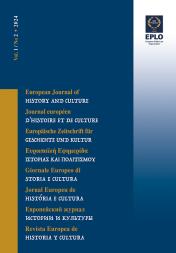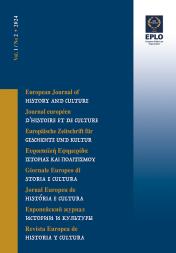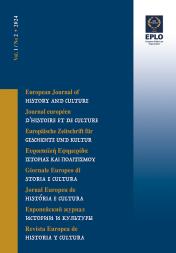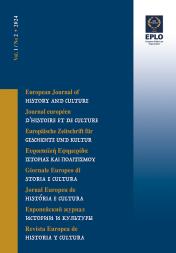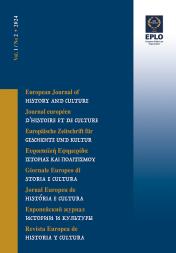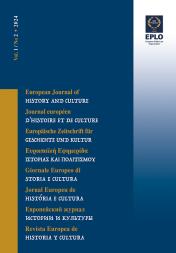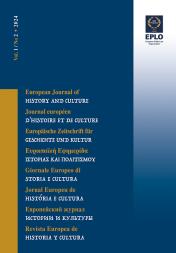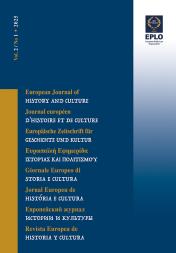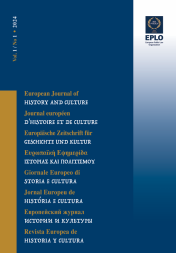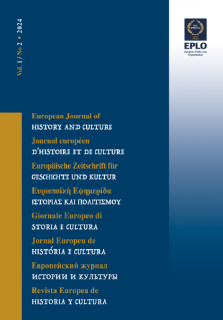
European Journal of History and Culture, Vol. 1 / No 2 • 2024
The second issue of the European Journal of History and Culture (Vol. 1 / No 2 • 2024) hosts 7 studies covering the period from the late 18th century to the mid 19th century and the reader can find contributions by academics and historians who analyze themes in the fields of history, history of art and culture.
The first paper in this issue deals with the journey to Greece of the Swedish Orientalist and Hellenist Jacob Jonas Björnståhl’s in 1779. He aimed to explore the monasteries of Meteora and their libraries, and to gain a deeper understanding of the country, its history and its people. Due to his travel writings and their rapid translation shortly after into other languages, several European travelers were inspired to visit Thessaly, with the ultimate goal of seeing Meteora and its monasteries. In this way, the image of Greece and its people shifted in the European consciousness.
In the second paper, the author presents the creation of consular posts (consulates general, consulates, vice-consulates, and trade agencies) in the port of Odesa, the main and most important port of the Black Sea Region from where exported huge quantity of grain. The appointment procedure and responsibilities of consuls, their characteristics and areas of activity, participation in commercial and social life, and connections with local ethnic communities are illuminated.
The following article analyzes the policy of Ali Pasha of Ioannina towards the Western powers, especially the aims and methods by which the Pasha tried to dominate the former Venetian possessions (Amvrakikos gulf, Ionian Islands), an area in which were also strongly interested the European forces. In addition are presented data from the Ali Pasha Archive of the Gennadius Library regarding the defence operation against the Ottoman aspirations in 1807 in Lefkada organized by the young Ioannis Kapodistrias.
The fourth article deals with the defence operation organised by Ioannis Kapodistrias in 1807 in Lefkada and the cooperation with him of two dynamic Hierarchs who had already demonstrated a notewhorthy route; the local Metropolitan, Parthenios II (Konidaris) of Lefkas and Santa Maura and Ignatios, Metropolitan of Naupaktos and Arta. On this occassion it was the first time after Constantinople’s Fall that powers from all over the Greek nation collaborated, in order to vindicate the freedom of a tiny part of the great Motherland.
An original analysis is carried out in the next paper, that is, the description of a non-unexpected event in preparation for the Greek Revolution related with the action of the “Society of Friends” (“Filiki Etairia”). The “Galatis Affair”, about Nikolaos Galatis, member of the Society, created the opportunity for Ioannis Kapodistrias, hign official in the Russian diplomacy, to investigate the Czar’s Alexander 1st disposition towards the Greek secret society and the Greek Revolution, ultimately, in the context of Russian Eastern policy.
The sixth paper presents George Nugent-Grenville, second Baron Nugent of Carlanstown (Dublin 1788 - Buckinghamshire 1850), Lord High Commissioner of the Ionian Islands (The United States of the Ionian Islands) from 12 November 1832 to 4 March 1835. Focuses on his political and social initiatives, as Commissioner, that encouraged a rapprochement between the British administration and the Greek population of the Ionian State.
Last but not least, the final article analyzes a poem dated 1842, a “Dialogue” between the statues of marshal Johann Matthias von der Schulenburg and Lord High Commissioner Frederick Adam, located in the large square of Corfu. Besides other important information, from their construction to their final placement, in the poem the reader can trace the poet’s attitude towards the British representative in the Ionian area, Commissioner Adam, which, undoubtedly reflected the general attitude or the reactions of part of the local population to colonial monuments and, by extension, to colonial rule.
Summary
V. Sabatakakis, The Swedish Orientalist and Hellenist Jacob Jonas Björnståhl’s Journey to Greece in 1779 and his Significance for the Dissemination of Knowledge about the Country and its People [IN ENGLISH] (14 pp. + 5 pp. Annex)
L. Bilousova, Foreign Consuls in Odesa and their International Presence (Late Eighteenth - Early Twentieth Century) [IN ENGLISH] (40 pp.)
P. Michailaris, The Ionian Visions of Ali Pasha and Lefkada [IN GREEK] (11 pp.)
Archim. I. Zampelis, Metropolitans Ignatios of Nafpaktos & Arta and Parthenios II of Lefkas & Santa Maura: Two Dynamic Ecclesiastical Leaders in the Defence of Lefkas (1807) [IN GREEK] (28 pp.)
S. Alifantis, A Non-unexpected Event in Preparation for the Greek Revolution: Kapodistrias and the “Galatis Affair” [IN ENGLISH] (37 pp.)
N. K. Kourkoumelis, A Philhellene Lord High Commisioner of the Ionian State, diligently ignored: George Nugent-Grenville, 2nd Baron Nugent of Carlanstown, GCMG [IN GREEK] (38 pp.)
S. C. Karydis, When Schulenburg “met” Adam [IN GREEK] (47 pp.+ 8 pp. Annex)















